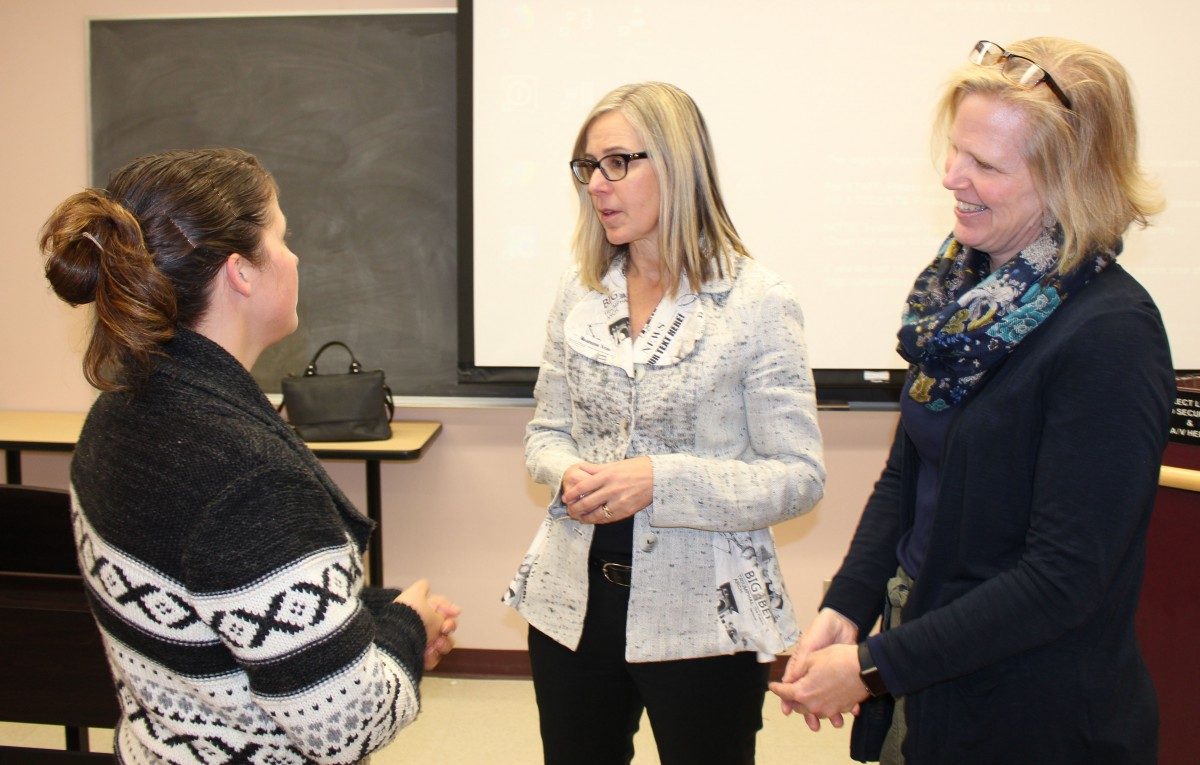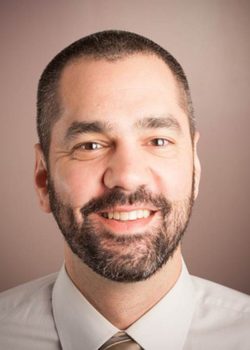
Dr. Mary Forhan (centre) and occupational therapy department head Leanne Leclair (right) speak to students following Forhan’s presentation on bariatric care needs.
Illuminate series sheds light on timely topics
Health and community environments have not been designed to take into account those who live with bariatric care needs. That was the message at a recent College of Rehabilitation Sciences’ Illuminate Speaker Series presentation on providing quality care to bariatric patients.
The Illuminate Speaker Series, launched by the College of Rehabilitation Sciences in February 2017, regularly brings in speakers from around the world (at times by Skype) to discuss research and scholarly activity in all rehabilitation sciences.
‘Bariatric care needs are a human rights issue’
Dr. Mary Forhan, associate professor of occupational therapy at the University of Alberta, presented the Oct. 16 lecture on methods of providing quality care for patients with bariatric care needs in both hospital and community settings.
Bariatric care needs result when an individual experiences restricted participation in activities of daily living associated with their body size. This can occur with body weights starting at about 250 lbs.
“Bariatric care needs are a human rights issue,” said Forhan, who has worked as an occupational therapist in the areas of mental health, chronic disease management and bariatric care for several years.
She noted there is a lot of weight bias and misinformation in the health-care system. “Patients with obesity are told time and time again they are a burden on the system,” she added. “It’s not the individuals – it’s the system.”
Over the past eight years, Forhan has developed a program of research focused on reducing the disability experienced by persons living with obesity and those with bariatric care needs.
She is currently developing national guidelines for the care of hospitalized patients with bariatric care needs. The guidelines, expected to be released in 2019, will be designed for anyone who has contact with patients on their care journey, from front-line workers to administrative staff.
One of the recommendations involves training for health-care professionals that establishes a foundation of trust and collaboration and is free of weight bias. “We need to make sure we make adaptations to the environment so we can provide safe, accessible, professional and respectful care for the individual,” she said.
Forhan’s presentation was also part of an Occupational Therapy Month lecture series organized by the college’s occupational therapy students.
Audiology evolution
At an Illuminate Speaker Series event earlier this month, the focus was on audiology testing. Dr. Justyn Pisa, coordinator of the University of Manitoba’s Surgical Hearing Implant Program, presented on Oct. 9 about the evolution of audiology in Manitoba over the last decade.

Dr. Justyn Pisa presented on the evolution of audiology in Manitoba earlier in October.
In addition to an overview of technological advances, he reported that it has become easier to detect hearing issues in newborn children through universal hearing screening legislation, which was introduced in Manitoba in 2016.
“The legislation specifically calls for the offer of a screening, but our acceptance rates are extremely high,” Pisa said, noting that in 2017, 99 per cent of all children born in the Winnipeg Health Region were screened for hearing loss within 24 hours of birth.
This has made a huge impact on treatment. The average age a child is initially given an implantable hearing device has improved significantly in recent years, Pisa said, from five years old in 2011 to 1.3 years old in 2018.
“We are implanting them before they develop significant speech and language delays, so their age at implantation is of vital importance,” he said.
Dr. Reg Urbanowski, dean, College of Rehabilitation Sciences, sees the Illuminate Speaker Series as a vehicle to invite interprofessional collaboration amongst the health professions and increase interest in occupational, physical, respiratory and rehabilitation therapies and their applications across the health-care disciplines in the Rady Faculty of Health Sciences.
The Illuminate speaker series is open to all Rady staff, faculty and students, along with the broader university and external community. Admission is free.






